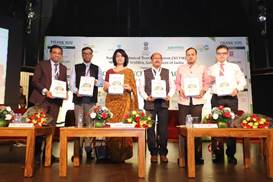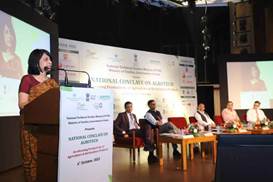Ministry of Textiles organizes National Conclave on Agrotech – Accelerating productivity of agriculture & horticulture products
Ministry of Textiles, under its flagship scheme National Technical Textiles Mission (NTTM), organized National Conclave on Agrotech emphasizing on the importance of accelerating productivity of agriculture & horticulture products in India in association with ITTA and SASMIRA, here today.


The event encompassed 5 technical sessions focusing on innovations for sustainable and resilient agriculture, Indian Standards and QCOs under Agrotextiles, performance and sustainability of Agrotextiles and recent advances in Agrotech technology including digital transformation in Agriculture and Horticulture. There was a special session also discussing future growth and opportunities in Agrotextiles. A Conclave Booklet and a Report on Indian Agrotech Industry Opportunity: Fibre to Field, were released during the National Conclave.
More than 150 participants attended the conclave including officials and representatives from Central Ministries, user Departments of Central and State Governments, Institutes, industry leaders, scientific experts, researchers, and professionals related to Agro textiles.
Ms. Rachna Shah, Secretary, Ministry of Textiles, Government of India, highlighted that agriculture plays a significant role in the Indian economy and the life of its citizens. Agriculture is also a major contributor with its share in country’s GDP has a long-term trend of around 18-20%.
She opined that Agro textiles can play an important role in addressing the unique agricultural challenges like climate variations, water constraints and high demand of agri-produce with limited arable land available. Use of Agro textiles plays a significant role in improving agricultural productivity and quality of Agri-based products by extending the growing cycle of crops, shielding plants from weather conditions and pests etc.
She stated that research and studies have shown that the use of Agro textiles in horticulture leads to increase in farm productivity by 2-5 times, increase in crop intensity, reduction in water consumption by 30- 45%, reduction in fertilizer usage by 25- 30%, and higher harvest cycle per year.
A collaborative approach between Certification Agencies, Research Organizations, Industry, Academia and Ministry is imperative to address the cost implications of Agro textiles and work together in increasing awareness and education amongst farmers for wider adoption by the larger agricultural community for the growth of the sector, she further added.
Shri. Shri. Z. P. Patel, Vice Chancellor, Navsari Agriculture University highlighted that there is an average farming production loss of 10-40% due to climate change, especially in the rain-fed areas. Agrotextiles such as Crop Cover, Mulch mats, Polyhouses, etc. hold the potential to manage and stimulate the microclimate for crops during farming leading to higher productivity for agriculture products, he emphasized.
He mentioned that on the back of diverse geographical location-based benefits of Agrotextiles, the segment has proved to be tremendously beneficial for the agricultural sector in India. There is a need for bio-degradable agro-fibre based agrobags which can be automatically degraded in the soil after the mulching process overtime, leading to planting process and sustainability.
There is a need of developing innovative Agro textile products like soil- degradable Agro-fabrics, artificial soil which are nutrient rich and has water holding capacity, super- absorbent polymer fibres to prevent waterlogging in high-rain areas, weather, and micro-organisms resistant fabrics, etc., he further added.
Shri. Rajeev Saxena, Joint Secretary, Ministry of Textiles, Government of India, highlighted that the India holds a tremendous potential in the global Agro textiles market of ~USD 12 Bn wherein India’s share is ~3%. Though India is one of the biggest markets for Fishing Nets, other Agro-textile products like mulch-mats, anti-bird nets holding significant share in global demand, can also be promoted in the context of Indian domestic market.
To ensure superior quality, wider safety, and comprehensive reliability of products in Agro textiles, he mentioned that Ministry of Textiles has notified QCO for 20 Agrotextile items, which will come in-effect from 1st April 2024.
Further, Ministry has also sanctioned 11 R&D projects in Agro textiles valuing INR 13.67 Cr for development of innovative products.
He also announced that Ministry of Textiles is going to establish a Climate Smart Agrotextile Demonstration Center to Revolutionize Agriculture through Digitized Microclimate Farming in partnership with SASMIRA.
Shri Priya Ranjan, Joint Secretary (INM Horticulture), Ministry of Agriculture & Farmers Welfare stated that Agrotextiles has a critical role to play in overcoming the unprecedented challenges agriculture sector faces due to climate change, soil degradation, and water scarcity which can threaten the very foundation of our food security.
Schemes such as Mission for Integrated Development of Horticulture (MIDH) has incorporated the different agrotextile products for wider usage and penetration. Furthermore, other collaborative segments within Ministry of Agriculture and Farmers’ Welfare are being looked into for further inclusion of agrotextile products, he further added.
He stated that by adopting the advanced technologies under Agrotextiles, our farmers can not only increase the agriculture yields but also increase functional benefits and reduced input costs. This, in turn, will translate into increasing farmers income and the
growth and development of the overall agriculture sector.
Shri Ashok Tiwari, Senior Director, SASMIRA appreciated the support of Ministry of Textiles and appreciated the participation of dignitaries from other organizations.

